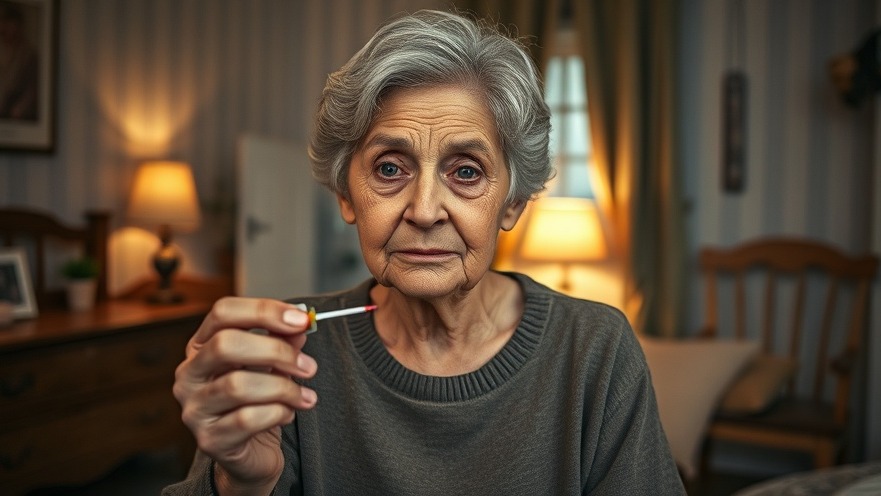
Addressing Pain: Why Stretching on the Bed Matters
Experiencing tight legs or back pain can be an all-too-familiar experience for many middle-aged and senior individuals. As our bodies age, we become more prone to discomfort due to stiff muscles or tension. In the video 'Tight Legs or Back Pain? Sit on the Bed and Do This!', Dr. Mandell highlights effective stretches that can be performed right from the comfort of your bed. This simple practice encourages mobility while reducing pain, making it easier to manage daily routines.
In 'Tight Legs or Back Pain? Sit on the Bed and Do This!', the discussion dives into effective stretches and their impact on comfort and mental wellness, exploring key insights that sparked deeper analysis on our end.
The Connection Between Pain and Mental Wellness
Seniors often encounter both physical pain and mental health challenges, with chronic pain impacting overall well-being. Mental wellness for seniors is crucial, and studies show that physical activity, including gentle stretching, can boost mood and reduce anxiety. Engaging in movement not only improves physical flexibility but can also promote positive thinking and resilience in later life. Recognizing the link between physical pain and emotional health is vital for seniors seeking to enhance their quality of life.
Yoga: A Gentle Approach to Healing
Yoga is widely regarded for its benefits beyond physical fitness; it serves as a powerful tool for mental wellness. Incorporating yoga for mental wellness can be especially advantageous for older adults. Simple breathing exercises and passive stretches foster relaxation and reduce stress hormone levels, making them particularly effective as relaxation techniques before bed. Imagine ending your day with a gentle bedtime yoga routine that alleviates physical discomfort while inviting a more peaceful state of mind.
Creating a Soothing Bedtime Routine
Establishing a calming bedtime routine can significantly improve sleep hygiene for seniors. Longing for uninterrupted sleep often leads to frustrations with sleep disorders in older adults. Exploring natural sleep remedies, such as herbal teas like chamomile or lavender, can promote better sleep. Committing to a consistent sleep schedule, coupled with calming activities like guided imagery for sleep or visualization techniques, creates a serene atmosphere conducive to restful nights.
The Importance of Cognitive Health and Sleep
Interestingly, sleep is linked to cognitive health in aging. REM sleep plays a crucial role in memory consolidation and overall brain health. Seniors often face the challenge of how to sleep without medication, turning to natural solutions instead. Cognitive exercises for seniors, such as memory games, can be introduced as part of a comprehensive approach to enhance cognitive function while improving sleep quality. With a focus on managing chronic pain and sleep, a holistic strategy can emerge, fostering an engaging mental environment while mitigating discomfort.
Managing Stress and Anxiety with Relaxation Techniques
Stress and anxiety are common among seniors, but with the right strategies, they can be effectively managed. Breathing techniques for anxiety, such as calm breathing at bedtime or practicing progressive muscle relaxation, can soothe racing thoughts and encourage tranquility. Additionally, relaxation podcasts for sleep and mindfulness exercises create an inviting path towards emotional clarity. Seniors can benefit by incorporating these manageable activities into their daily lives, thereby enhancing their coping strategies.
Natural Supplements that Support Sleep
Exploring safe sleep aids for seniors is another avenue for managing sleep problems. Natural supplements, including melatonin and omega-3 fatty acids, can support better sleep patterns while contributing to mental clarity and emotional strength. Herbal remedies for insomnia, such as valerian root, can be considered as additional options. Engaging with a healthcare provider to tailor approaches specifically to an individual's needs ensures informed and safe usage.
In conclusion, integrating simple stretches and relaxation techniques can lead to improved mental wellness and restful sleep for seniors. By acknowledging the links between physical pain, emotional well-being, and progressive routines, older adults can actively transform their evenings and create a more soothing path to wellness. So why not start today? Consider establishing a new routine that prioritizes relaxation, reducing discomfort, and promoting restful nights. Small adjustments, like those demonstrated in Dr. Mandell’s video, can lead to significant improvements in daily living.
 Add Row
Add Row  Add
Add 




 Add Row
Add Row  Add
Add 


Write A Comment